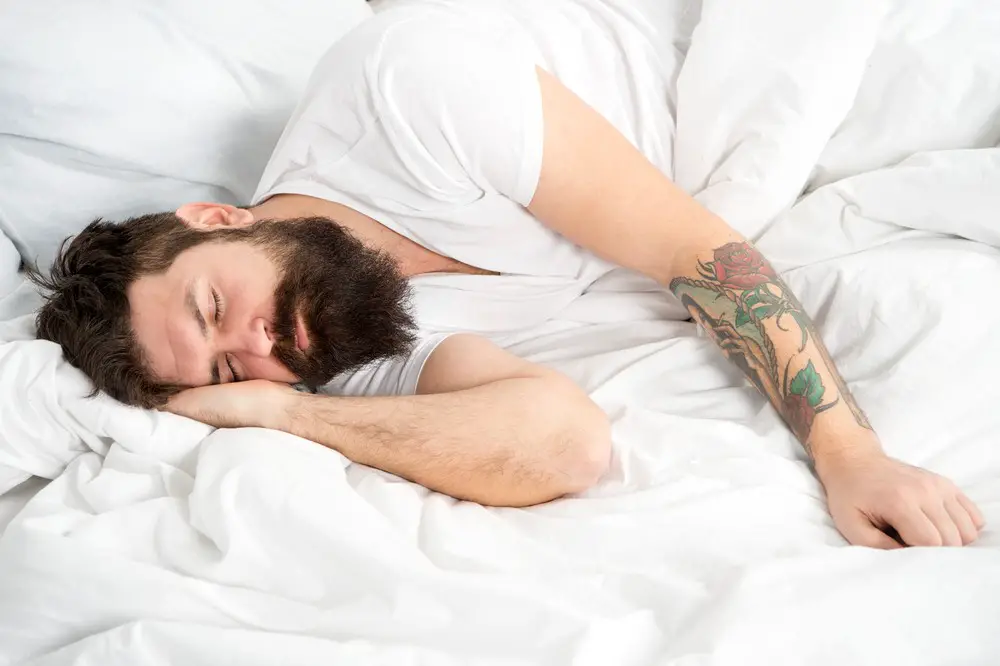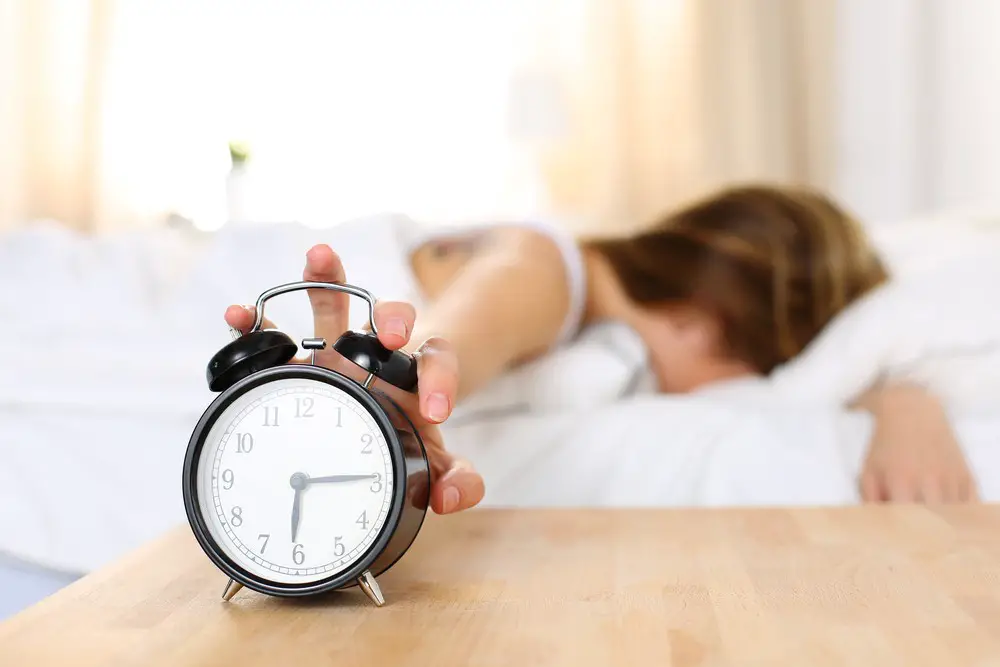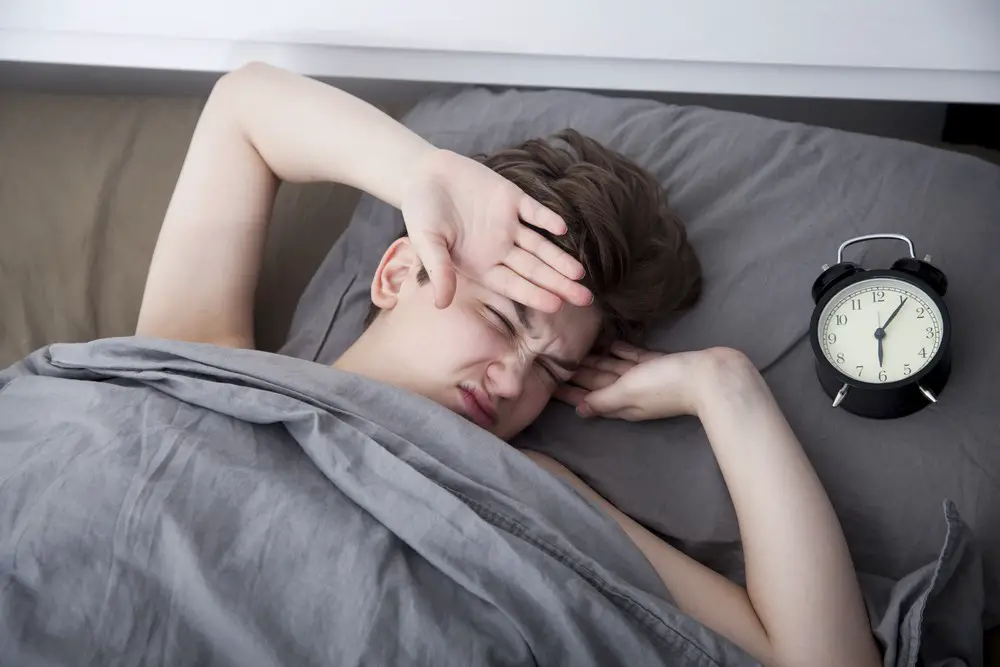As a BetterHelp affiliate, we receive compensation from BetterHelp if you purchase products or services through the links provided
Too much sleep may be just as harmful as not enough, but how many hours do you need? Are 6 hours of sleep enough?
Most healthy adults need between seven and nine hours of restful sleep per night to feel alert and oriented throughout the following day. Younger children need much more sleep to grow and develop properly. The true definition of “enough sleep” is a number that leaves you feeling refreshed and energized throughout the next day.
This article will discuss when six hours of sleep is enough when it isn’t and how you can determine the right amount of sleep for you.
How Much Sleep Is Enough Sleep?
The average person generally needs between seven and nine hours of sleep per night to feel their healthiest and happiest. The starting point to determining how much sleep is enough begins with age. It turns out that the younger a person is, the more sleep they need to power their development and growth.
- Newborns aged 0-3 months old need a whopping 14 to 17 hours of sleep within 24 hours, including naps
- Infants ages 4-12 months need 12-16 hours
- Toddlers ages 1-2 years old need 11-14 hours
- Preschool children aged 3-5 years old need 10-13 hours
- School-age children 6-12 years old require 9-12 hours of sleep
- Teenagers from 13-18 years old should get 8-10 hours of sleep
- Adults aged 18-60 years old require seven or more hours of sleep
- Adults aged 61 to 64 need 7-9 hours of sleep
- Adults aged 65 and older can get away with the least amount of sleep per group, at 7-8 hours of sleep per night
Is 6 hours of sleep enough?
In most cases, six hours of sleep is not enough nor recommended for healthy adults; however, if you feel well-rested and alert all day after six hours of sound sleep quality, this may be a healthy pattern for you.

Determining How Much Sleep You Need
Beyond age, though, the amount of sleep you need per night can differ from person to person based on your overall health, sleeping patterns, and activity level.
If, after seven hours of sleep, you feel happy, healthy, and productive, then seven hours of sleep is optimal for you. If not, try to add one or two more hours a night. If you have underlying health issues or are at a higher risk for diseases, your body needs more sleep.
If your typical day consistently needs high energy levels or cognitive performance, such as playing sports or working a labor-intensive job, consider how you feel after each day. If your energy levels dip and you lack consistent energy, try adding one or two more hours of sleep a night.
In that same vein, if your daily activities depend on your alertness for safety, like operating heavy machinery or driving long distances for many hours, feeling sleepy during the day can be dangerous. In these cases, add an hour or two to your sleep schedule.
If you depend on caffeine to always get you through the day or have a history of sleeping problems, an extra few hours of sleep wouldn’t hurt. Also, if you typically sleep more on the weekends when you have an open schedule than on a typical workday, that is a sign you need more sleep in your everyday life.
Who Determines How Much Sleep Is Enough?
The top organizations studying sleep in the United States are the American Academy of Sleep Medicine (AASM), the Sleep Research Society (SRS), and the National Sleep Foundation. Their findings are backed by the American Academy of Pediatrics (AAP) and the Centers for Disease Control and Prevention (CDC).
Each of these institutions has published studies and recommendations for how much sleep people need and each offers around the same number of hours for children and adults.
AASM and SRS conducted a joint study and determined adults aged 18-60 need seven or more hours of sleep per night. Their study on children also found similar results.
How to Know If You Are Well-Rested
Sometimes it’s hard to determine if you are well-rested just based on feelings alone, but other factors help you know if you are well-rested.
Timing How Fast You Fall Asleep
One starts when you go to fall asleep. If you are lights out in under five minutes, that is a sign you are sleep deprived. The average well-rested person should take 15 to 25 minutes to fall asleep.

Waking Up Naturally
Another great indicator you are well-rested is if you wake up naturally without an alarm. If you wake up before your alarm and don’t feel awful, you just had a good night’s rest.
Feeling Energized
If you go about your day and realize later that you didn’t crave caffeine in the afternoon, that is a good sign you are well-rested. Many people reach for a mid-day coffee or energy drink and rely on it to finish the day.
Monitoring Your Weight and Insulin
The fewer hours people sleep, the more they weigh, and the more likely they will put on additional weight over time. This is because when you don’t sleep enough, your hormones are out of whack, causing your insulin production to be abnormal.
When your insulin levels are normal, you feel full and don’t have weird cravings for junk food, specifically carbohydrates, starches, and sugar. So, if you’ve noticed you are maintaining or losing weight without changing your diet or exercising more, you could attribute this to good sleep.
Clear Skin
Another sign you are well-rested is if your skin is clear of acne and glowing from the inside out with no dark circles under your eyes. When you lose hours of sleep, you add stress to your body, increasing glucocorticoid production and leading to unwanted acne breakouts. Maybe “beauty sleep” is real after all.
Monitoring Your Mood
Another critical indicator deals with your mood. Good sleep can lead to positive feelings and optimism. It also leads to less stress, less anxiety, less risk of depression, and more motivation. It also helps you control your reactions to unpleasant events.
How to Know If You’re Experiencing Poor Sleep
Sometimes, people can get enough hours of sleep but still wake up groggy because their sleep quality is subpar. These signs may help you determine if you are experiencing poor sleep.
The Effects of Poor Sleep
If it takes you more than 30 minutes to fall asleep, you wake multiple times during the night, and you lie awake in the middle of the night for more than 20 minutes before falling back asleep, you are experiencing subpar sleep. If you feel tired, have difficulty concentrating, and rely on caffeine to make it through the day, you need better quality sleep.
Other tell-tale signs are physical. If your eyes are red, puffy, or contain dark circles or bags, or your skin is breaking out with acne, this could be attributed to harmful quality sleep.
Lack of sleep messes with your hormone and insulin levels, so if you feel hungry more often, crave junk food, or are experiencing weight gain, you can also attribute that to substandard sleep.
It’s also important to pay attention to your mood to determine the quality of your sleep. Lack of sleep can cause feelings of stress, emotional exhaustion, and anger.
The Effects of Sleeping Too much
When it comes to hours of sleep, there is a sweet spot, and too little or even too much sleep can have adverse effects or signal that something isn’t quite right with your body. So, is six hours of sleep enough?
The optimal number of hours of sleep per night for the average adult is seven to nine hours, so if you find yourself still hitting snooze multiple times after nine hours of sleep, you could have an underlying health issue.
Oversleeping is connected to many health problems, including headaches, obesity, depression, heart disease, and type two diabetes, but the cause and effect aren’t precisely known. Some doctors suggest the correlation is your body needs more hours of sleep if you are sick or have an underlying condition, not that oversleeping is causing these ailments.
Some conditions increase the amount of sleep you need. These disorders include narcolepsy, delayed sleep phase syndrome, and idiopathic hypersomnia.
Other conditions can mess with the quality of your sleep, causing you to feel tired enough to want to oversleep. These are sleep apnea, restless leg syndrome, bruxism, chronic pain, and specific medication.
If you are sleeping too much regularly, you should see a doctor or undergo a sleep study. Most of the above conditions have treatments and can help improve your sleep quality.
What Happens When You Sleep?
Getting enough sleep is vital to your body and mind as it’s the only time your brain and body can slow down enough to go through recovery. This allows you to function during your waking hours. When you fall asleep, your brain neurons switch to a sleeping state and send signals throughout your body, creating changes that reinforce your immune and cardiovascular systems and regulate your metabolism.
One of the first changes your body experiences is that your breathing and heart rate begin to slow. Then, your muscles relax, and your body’s total energy expenditure drops. In fact, in some stages of sleep, your muscles are completely paralyzed except for your lungs and eye muscles.
Your brain activity also changes while you sleep. At first, your brain waves slow down drastically. During some stages, there are quick bursts of activity. These cycles of brain activity help with memory consolidation and critical cognitive abilities.
Another significant change in the sleeping body is hormone levels, which fluctuate throughout the different stages of sleep. Melatonin is produced to promote sleep. Growth hormones flood your body to support metabolism, muscle, and brain development.
The hormones ghrelin and leptin control appetite. The hormone cortisol regulates your body’s stress response, lowers during sleep, and rises when you awaken.
What Happens During Sleep Deprivation?
Sleep deprivation is a term that describes a state caused by insufficient sleep or inadequate quality of sleep. This can include general sleeplessness and circadian rhythm sleep disorders. Getting insufficient sleep can cause short and long-term problems.
Even if you only miss an hour and a half of sleep one night, it can affect your body the next day and still count as sleep deprivation. Some short-term problems are brain fog, excessive daytime sleepiness, and impaired memory, affecting your ability to remember, think, and process information.
Sleep deprivation can make you moody and easily angered, affecting your relationship with others and your quality of life, especially when you lack the energy to do things you enjoy. You also risk getting into a car accident as thousands of fatal crashes yearly are due to drowsy drivers.
If someone is sleep deprived for the long haul, they will experience long-term problems. These can be as serious as diabetes, heart attack, heart failure or stroke, and high blood pressure. You can also face depression, reduced immune system function, lower sex drive, and obesity.
Sleep deprivation can also affect your appearance, including wrinkles, baggy under eyes, dark circles, and acne.
How to Calculate When You Should Go to Bed
To determine when you should go to bed, you first need to figure out how many hours of sleep you need by starting with your age. If you are between 18 and 64 years old, start with seven and nine hours of sleep.
You also need to consider your sleep cycle. You need to complete five or six 90-minute sleep cycles for optimal health. Seven and a half hours of sleep would be five complete cycles and nine hours of sleep would include six cycles.
Next, you need to note your wake-up time and allow yourself 15 minutes to fall asleep. So, say you want to wake up at 7:00 am and get six complete sleep cycles in. That means you need a sleep duration of nine hours with 15 minutes to get there, so you should aim to go to bed at 9:45 pm.
If you’d like a full breakdown of wake-up times versus sleep cycles, click here.
The Different Types of Sleep
When you are asleep, your body and mind go through four to five sleep cycles, each made up of four sleep stages. Within these stages, the two categories of sleep are rapid eye movement (REM) and non-REM sleep.
Non-REM Sleep
The first three stages of sleep are considered non-REM. Stage one is when your body transitions into sleep as you doze off. Stage two is when your body and mind slow as you go deeper into sleep.
In stage three, your body and overall brain activity continue to slow until it reaches recovery mode, known as deep sleep.
REM Sleep
The final stage of sleep is REM sleep. This stage is different from all other stages as your brain activity quickens to similar levels as your brain awake.
During this stage, your heart rate and breathing will increase, but your muscles will be paralyzed except for your lungs and eye muscles. This is when people experience intense dreams, and muscle paralyzation prevents you from acting out your dreams. All these sleep stages will be experienced four to five times when you go through each cycle, lasting anywhere from 70 to 120 minutes.
How to Improve Your Sleep
Not all sleep is good sleep. You may lay in bed for nine hours, but if you get up multiple times, you aren’t going to wake up rested. Luckily, there are some tricks that you can incorporate into your day to create a relaxing bedtime routine and help improve your sleep.
During the day, make exercising a habit, but don’t do it too close to bedtime as that could lead to interrupted sleep. Make sure you spend time in the sun or bright lights so your body’s circadian rhythm knows when it should be awake and vice versa.
Avoid taking long naps, especially in the afternoon, and wake up simultaneously every day, even on the weekends.
Before bed, limit caffeine, nicotine, and alcohol. Avoid electronics 30 minutes before bed since the lights can stimulate your brain. Create a relaxing routine and sleep environment with soothing music, a warm bath, dim lights, and a low thermostat, ideally around 65 degrees Fahrenheit.
In bed, avoid the blue light of screens and instead read a book or listen to white noise. Close your eyes, relax, and steady your breathing.
If you still can’t fall asleep after 20 minutes, leave the room and read a book or listen to music until you feel tired. You may also consider taking sleep medicine like melatonin tablets. Sleep medicine can help you regulate your sleep schedule and get enough sleep, but it should ideally only be used short-term.
Once you make this routine constant, it will feel easier, feel relaxed, and start to enjoy bedtime again.
In Summary
So, is 6 hours of sleep enough?
Sleep is one of the most critical factors in maintaining optimal health, but these days, it’s one of the first things to be cut short when we get busy. Everyone is unique; some people can live their best lives off six hours of sleep, while others need nine. Seven to eight hours of restful sleep is the average sleep requirement for most adults.
It’s important to reflect on your body and mind to determine how much sleep you need per night to feel your best. Then, make a regular sleep schedule and stick to it to achieve the ideal sleep cycle and feel your best every day.
- Breaking the Silence: Why Men’s Mental Health Matters More Than Ever - April 15, 2025
- How to Transform a Home’s Patio Space into a Relaxing Space - March 23, 2025
- 5 Strategies to Use a Cell Phone to Help Manage Your Stress - March 23, 2025
This site contains affiliate links to products. We will receive a commission for purchases made through these links.



